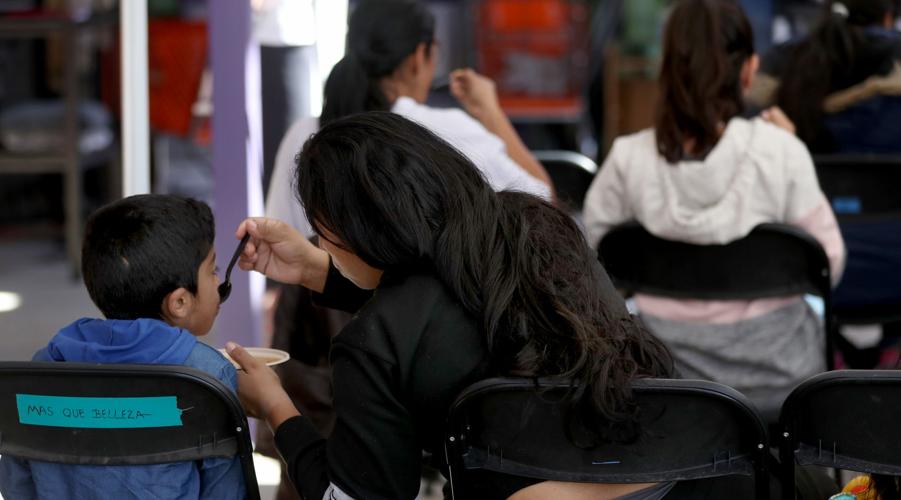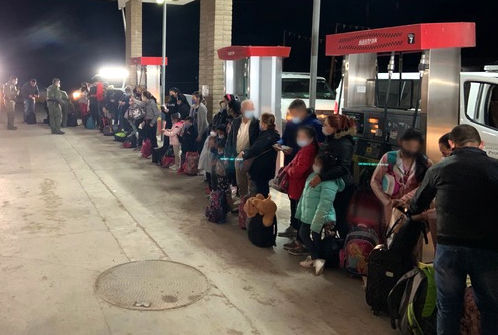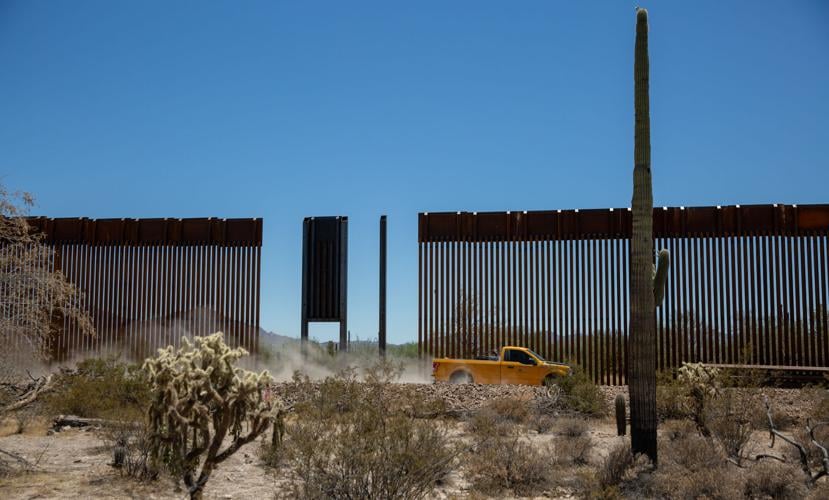The Border Patrol released 28 migrants in Ajo on Friday morning, marking a shift in how the agency deals with a recent increase in families crossing the border, and spurring local officials to hustle to find transportation for them.
In the month leading up to Friday, the Border Patrol released migrants in Yuma and nonprofit organizations transported them to shelters in Tucson and Phoenix, which have more resources and experience than smaller cities and towns like Yuma and Ajo.
One group of families that was released in Ajo arrived at the Casa Alitas shelter in Tucson around 3 p.m. Friday. They sat in folding chairs as volunteers offered them a snack, went through their paperwork and checked for any medical issues.
Children made up about two-thirds of those family members, many of whom came from Venezuela, Cuba and Ecuador.
One young girl from Venezuela munched on watermelon slices as she swung her feet under her chair. She kept a stuffed giraffe tucked under her arm while her mother and father spoke with a volunteer.
Nearby, a volunteer talked with a mother about getting the right-sized shirt and pants for her 7-year-old son.
The Casa Alitas Welcome Center is run by Catholic Community Services out of a converted wing of Pima County’s juvenile detention center. The shelter there serves as a replacement for the former Benedictine Monastery on Country Club Road that housed thousands of asylum seekers in 2019.
Generally, families stay at shelters in Tucson for a few days, enough time to arrange transportation to other cities where they can live with relatives and friends while their asylum claims are processed.
The families released in recent weeks are headed for numerous states, including Florida, Massachusetts and Indiana, according to staffers at the shelter.
The Border Patrol gave little warning to local governments and nonprofits before releasing the families in Ajo around 9 a.m. Friday, Pima County Administrator Chuck Huckelberry said.
“We found out about the releases yesterday,” which led to a “scramble to get a bus” for the migrants, Huckelberry said Friday.
Democrats who long blistered the Trump administration's hard line immigration policies are suddenly in a tough political bind when it comes to the border but Democratic House Speaker Nancy Pelosi said Friday that the "Biden administration has this under control."
He said he wants the Border Patrol to resume transporting migrants to Tucson and Phoenix, rather than depend on local governments and nongovernmental organizations.
“It is poor practice and should not continue,” Huckelberry said.
The releases in Ajo contrast with how the Border Patrol handled asylum seekers in 2019, Huckelberry said.
During the spike in asylum seekers that year, the Border Patrol and other federal agencies transported more than 20,000 asylum seekers to shelters in Tucson.
Huckelberry said he did not know whether Border Patrol officials planned to continue releasing migrants in Ajo. He described communication from the Border Patrol as “poor to nonexistent.”
Customs and Border Protection did not respond to an inquiry Friday from the Arizona Daily Star.
The Border Patrol’s Tucson Sector has seen a steady increase in apprehensions since April, including a spike from January to February.
Most of the migrants apprehended in the Tucson Sector are single adults, but migrants traveling as families are sharply increasing, according to Border Patrol statistics.
The number of migrants traveling as families more than doubled in the Tucson Sector from January to February, rising from about 400 to nearly 1,000.
The Yuma Sector saw an increase from about 560 to more than 1,700, which prompted the Border Patrol to release certain migrants to nonprofit aid groups.
“This is exactly what we’ve seen in Yuma, now we’re seeing it in Ajo,” said Diego Piña Lopez, program manager at the Casa Alitas shelter.
Ideally, federal agencies would “go a few extra hours” to transport migrants to Tucson and Phoenix, Piña Lopez said.
Casa Alitas staff was given “little warning” by federal agencies about the releases in Ajo, he said.
Casa Alitas sent volunteers to Ajo to help with coronavirus testing, arrange bus transportation and generally support the migrants as they were released.
Casa Alitas is recseiving about 80 migrants per day, mostly families from Cuba, Venezuela and Brazil, Piña Lopez said.
The shelter is not taking in unaccompanied children.
The influx is more than the shelter has seen in recent months, but below the roughly 120 asylum seekers released on a typical day in 2019, Piña Lopez said.
The migrants who are released in Ajo are being transported in groups of about 15, rather than in numbers to completely fill a bus, as a precaution against spreading the coronavirus, Huckelberry said.
Migrants are tested for the virus, which so far has produced a “few positive cases” in recent weeks, Huckelberry said.
A positive test result leads to an isolation period and then another test.
Amid the increase in border apprehensions, CBP officials plan to open tent-like facilities to house migrants in Tucson and Yuma.
Those facilities are expected to open in the middle of April, according to information CBP provided to U.S. Sen. Kyrsten Sinema.
It is unclear where the migrants released in Ajo were apprehended.
A Border Patrol agent told the Willcox City Council on Feb. 18 that the plan in the Tucson Sector was to “release that person at the location where that person was first encountered,” The Arizona Republic reported Monday.
In 2018 and 2019, the area south of Ajo saw numerous large groups of asylum seekers, sometimes as many as 300 in a group, cross the border and flag down agents.
Border barriers south of Ajo at the time consisted mostly of head-high vehicle barriers that asylum seekers could walk between. The 30-foot-tall border wall now runs along nearly all the border south of Ajo.
On Thursday, the head of the Border Patrol’s Tucson Sector, John R. Modlin, posted photos on Twitter of migrants being processed by agents at what appeared to be a gas station.
Modlin said agents arrested more than 240 migrants in four separate encounters the previous night but did not say where the groups were encountered.
The groups consisted mainly of families and unaccompanied minors, Modlin said.
So far, Arizona has seen far fewer migrant families in recent weeks than border cities in Texas.
The Biden administration requested planes to transport migrant families from Texas to states near the Canadian border for processing, the Washington Post reported Friday.
On Thursday and Friday, roughly 2,000 migrants traveling as families and unaccompanied children crossed the Rio Grande.
Photos: Guatemalans cross border into Mexico in new test of migrant strategy
APTOPIX Mexico Central America Migrants
Updated
A man rests next to the Suchiate River in Ciudad Hidalgo, on the Mexican border with Guatemala, Sunday, Jan. 19, 2020. Mexican authorities have closed a border entry point in southern Mexico after thousands of Central American migrants tried to push across a bridge between Mexico and Guatemala. (AP Photo / Marco Ugarte)
Mexico Central America Migrants
Updated
Honduran migrants they wash their clothes in the Suchiate River as a Mexican National Guardsman stands on guard in Ciudad Hidalgo, on the Mexican border with Guatemala, Sunday, Jan. 19, 2020. Mexican authorities have closed a border entry point in southern Mexico after thousands of Central American migrants tried to push across a bridge between Mexico and Guatemala. (AP Photo / Marco Ugarte)
Mexico Central America Migrants
Updated
A migration officer escorts a Honduran migrant that has just swam across the Suchiate river from Guatemala into Mexico, in Ciudad Hidalgo, Sunday, Jan. 19, 2020. Mexican authorities have closed a border entry point in southern Mexico after thousands of Central American migrants tried to push across a bridge between Mexico and Guatemala. (AP Photo/Marco Ugarte)
Guatemala Central America Migrants
Updated
Migrants sit at the bridge spanning the Suchiate River in Tecun Uman, Guatemala, Monday, Jan. 20, 2020. More than a thousand Central American migrants hoping to reach United States marooned in Guatemala were preparing to again walk en masse across a bridge leading to Mexico in an attempt to convince authorities there to allow them passage through the country. (AP Photo/Moises Castillo)
Guatemala Central America Migrants
Updated
Migrants rest at the bridge spanning the Suchiate River in Tecun Uman, Guatemala, Monday, Jan. 20, 2020. More than a thousand Central American migrants hoping to reach United States marooned in Guatemala were preparing to again walk en masse across a bridge leading to Mexico in an attempt to convince authorities there to allow them passage through the country. (AP Photo/Moises Castillo)
Guatemala Central America Migrants
Updated
Migrants gather at the bridge spanning the Suchiate River in Tecun Uman, Guatemala, Monday, Jan. 20, 2020. More than a thousand Central American migrants hoping to reach United States marooned in Guatemala were preparing to again walk en masse across a bridge leading to Mexico in an attempt to convince authorities there to allow them passage through the country. (AP Photo/Moises Castillo)
Guatemala Central America Migrants
Updated
Migrants gather at the bridge spanning the Suchiate River in Tecun Uman, Guatemala, Monday, Jan. 20, 2020. More than a thousand Central American migrants hoping to reach United States marooned in Guatemala were preparing to again walk en masse across a bridge leading to Mexico in an attempt to convince authorities there to allow them passage through the country. (AP Photo/Moises Castillo)
APTOPIX Guatemala Central America Migrants
Updated
Migrants gather at the bridge spanning the Suchiate River in Tecun Uman, Guatemala, Monday, Jan. 20, 2020, at the border with Mexico. More than a thousand Central American migrants hoping to reach United States marooned in Guatemala were preparing to walk en masse across this bridge leading to Mexico in an attempt to convince authorities there to allow them passage through the country. (AP Photo/Santiago Billy)
Guatemala Central America Migrants
Updated
Migrants gather at the bridge spanning the Suchiate River in Tecun Uman, Guatemala, Monday, Jan. 20, 2020. More than a thousand Central American migrants hoping to reach United States marooned in Guatemala were preparing to walk en masse across a bridge leading to Mexico in an attempt to convince authorities there to allow them passage through the country. (AP Photo/Santiago Billy)
Mexico Central America Migrants
Updated
Locals cross the Suchiate River from Mexico to Guatemala near Ciudad Hidalgo, Mexico, Monday, Jan. 20, 2020. More than a thousand Central American migrants hoping to reach United States marooned in Guatemala were preparing to walk en masse across a bridge leading to Mexico in an attempt to convince authorities there to allow them passage through the country. (AP Photo/Marco Ugarte)
Mexico Central America Migrants
Updated
Honduran migrants walk in the Suchiate River after washing up near the bridge, top, as they return to Tecun Uman, Guatemala, Monday, Jan. 20, 2020, on the border with Mexico. More than a thousand Central American migrants hoping to reach United States marooned in Guatemala were preparing to walk en masse across a bridge leading to Mexico in an attempt to convince authorities there to allow them passage through the country. (AP Photo/Marco Ugarte)
APTOPIX Guatemala Central America Migrants
Updated
Central American migrants cross the Suchiate River by foot from Tucun Uman, Guatemala, to Mexico, Monday, Jan. 20, 2020. More than a thousand Central American migrants hoping to reach United States marooned in Guatemala are walking en masse across a river leading to Mexico in an attempt to convince authorities there to allow them passage through the country. (AP Photo/Moises Castillo)
Guatemala Central America Migrants
Updated
Central American migrants cross the Suchiate River by foot from Tucun Uman, Guatemala, to Mexico, Monday, Jan. 20, 2020. More than a thousand Central American migrants hoping to reach United States marooned in Guatemala are walking en masse across a river leading to Mexico in an attempt to convince authorities there to allow them passage through the country. (AP Photo/Moises Castillo)
Guatemala Central America Migrants
Updated
Seen through the fence on the border bridge, Central American migrants cross the Suchiate River by foot from Tucun Uman, Guatemala, to Mexico, Monday, Jan. 20, 2020. More than a thousand Central American migrants hoping to reach United States marooned in Guatemala are walking en masse across a river leading to Mexico in an attempt to convince authorities there to allow them passage through the country. (AP Photo/Moises Castillo)
Guatemala Central America Migrants
Updated
Central American migrants holding Honduras' national flag stand on the legal border crossing bridge over the Suchiate River that connects Tucun Uman, Guatemala with Ciudad Hidalgo, Mexico, Monday, Jan. 20, 2020. More than a thousand Central American migrants hoping to reach United States marooned in Guatemala were preparing to walk en masse across a bridge leading to Mexico in an attempt to convince authorities there to allow them passage through the country. (AP Photo/Moises Castillo)
Guatemala Central America Migrants
Updated
Central American migrants rally on the legal border crossing bridge over the Suchiate River that connects Tucun Uman, Guatemala with Ciudad Hidalgo, Mexico, Monday, Jan. 20, 2020. More than a thousand Central American migrants hoping to reach United States marooned in Guatemala were preparing to walk en masse across a bridge leading to Mexico in an attempt to convince authorities there to allow them passage through the country. (AP Photo/Moises Castillo)
Guatemala Central America Migrants
Updated
Central American migrants cross the Suchiate River by foot from Tucun Uman, Guatemala, to Mexico, Monday, Jan. 20, 2020. More than a thousand Central American migrants hoping to reach United States marooned in Guatemala are walking en masse across a river leading to Mexico in an attempt to convince authorities there to allow them passage through the country. (AP Photo/Moises Castillo)
Mexico Central America Migrants
Updated
A Central American migrant kneels with a Honduran flag after crossing the Suchiate River from Guatemala to Mexico as other migrants follow behind, near Ciudad Hidalgo, Mexico, Monday, Jan. 20, 2020. More than a thousand Central American migrants hoping to reach United States marooned in Guatemala are walking en masse across a river leading to Mexico in an attempt to convince authorities there to allow them passage through the country. (AP Photo/Marco Ugarte)
Guatemala Central America Migrants
Updated
Central American migrants cross the Suchiate River by foot from Tucun Uman, Guatemala, to Mexico, Monday, Jan. 20, 2020. More than a thousand Central American migrants hoping to reach United States marooned in Guatemala are walking en masse across a river leading to Mexico in an attempt to convince authorities there to allow them passage through the country. (AP Photo/Santiago Billy)
Guatemala Central America Migrants
Updated
Central American migrants cross the Suchiate River by foot from Tucun Uman, Guatemala, top left, to Ciudad Hidalgo, Mexico, Monday, Jan. 20, 2020. More than a thousand Central American migrants hoping to reach United States marooned in Guatemala are walking en masse across a river leading to Mexico in an attempt to convince authorities there to allow them passage through the country. (AP Photo/Santiago Billy)
Mexico Central America Migrants
Updated
Mexican National Guards stand on the bank of the Suchiate River where Central American migrants are crossing from Guatemala, near Ciudad Hidalgo, Mexico, Monday, Jan. 20, 2020. More than a thousand Central American migrants hoping to reach United States marooned in Guatemala are walking en masse across a river leading to Mexico in an attempt to convince authorities there to allow them passage through the country. (AP Photo/Marco Ugarte)
Mexico Central America Migrants
Updated
Mexican National Guards stand on the bank of the Suchiate River where Central American migrants are crossing from Guatemala, near Ciudad Hidalgo, Mexico, Monday, Jan. 20, 2020. More than a thousand Central American migrants hoping to reach United States marooned in Guatemala are walking en masse across a river leading to Mexico in an attempt to convince authorities there to allow them passage through the country. (AP Photo/Marco Ugarte)
Mexico Central America Migrants
Updated
A Central American migrant woman and child who crossed the Suchiate River from Guatemala to Mexico are stopped by Mexican security forces on the riverbank near Ciudad Hidalgo, Mexico, Monday, Jan. 20, 2020. More than a thousand Central American migrants hoping to reach United States marooned in Guatemala are walking en masse across a river leading to Mexico in an attempt to convince authorities there to allow them passage through the country. (AP Photo/Marco Ugarte)






